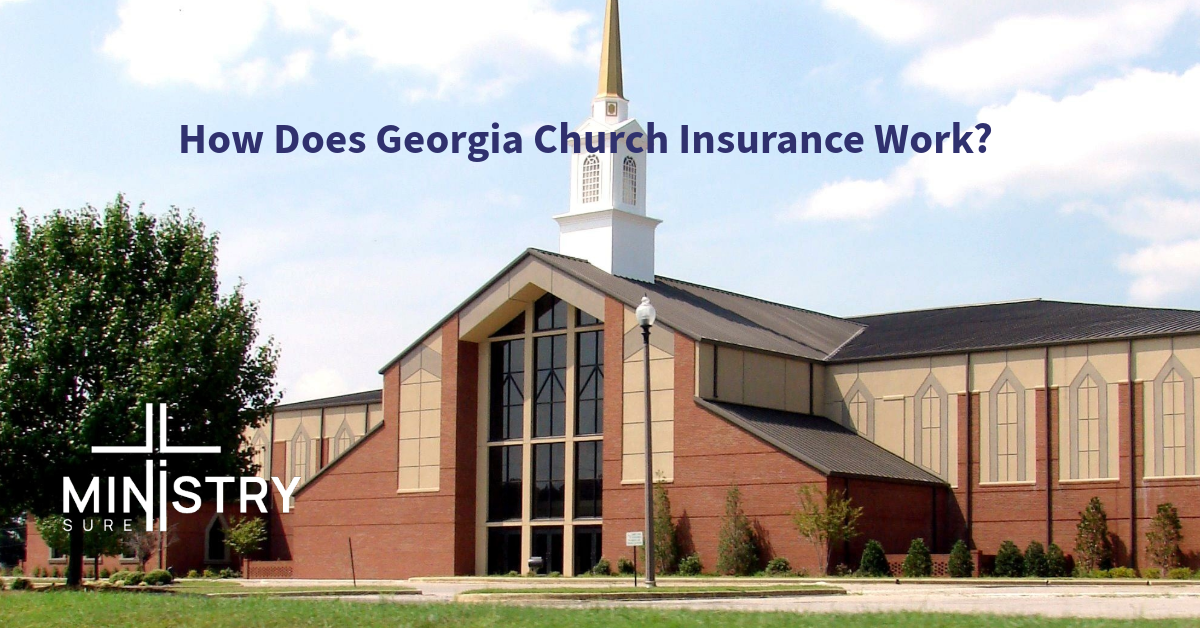All Grace Church in Georgia is getting ready to open next year. Pastor John and his team have worked tirelessly to build a welcoming space for their community. They’ve even identified a board of deacons to help manage the church. As they finalize their preparations, they realize they need to think about potential problems that could arise. For example, what if a storm damages their new roof or someone gets hurt during a church event? Pastor John understands that protecting their investment and community is important. He discusses the issue with the deacons, and they all agree that they need to be aware of the risks. They decide to learn about church insurance and turn to MinistrySure for help. MinistrySure explains how insurance works for churches and why it’s crucial for their ministry’s success and peace of mind. As a church leader in Georgia, do you wonder “how does Georgia church insurance work?”. If so, read on!
What is Church Insurance?
Church insurance is a special kind of insurance that helps protect churches from different risks. It covers things like buildings, people, and activities. MinistrySure helps churches like All Grace Church find the right insurance to keep them safe. Churches, like other non-profit organizations, need specific types of insurance to cover their unique risks. Church insurance brokers play a key role in helping these organizations find the best policies. They provide insurance services tailored to the needs of Houses of worship.

Types of Coverage Included in Church Insurance
Church insurance usually includes several types of coverage to address different risks:
- Commercial Property Insurance: This covers the church building, equipment, and other property from damage like fire, theft, or storms. For example, if a storm damages the church roof, commercial property insurance helps pay for the repairs. This also covers personal property such as musical instruments and other valuable items inside the church.
- Liability Protection: This helps if someone gets hurt at the church or during church activities. It covers legal costs and damages. If a visitor slips and falls during an event, liability protection can cover the medical expenses and legal fees. Sometimes, additional medical bills can be covered under a liability policy.
- Volunteer Liability: This covers issues that might come up because of actions by church volunteers. For instance, if a volunteer accidentally damages someone’s property while helping with church activities, this insurance helps cover the costs.
- Mission Trips: This special coverage protects church members and volunteers when they travel for mission trips. If someone gets injured or loses their belongings while on a mission trip, this insurance helps manage the costs.
- Cyber Liability Insurance: This protects the church if there is a data breach or cyber-attack. With many churches now using online systems for donations and member information, cyber liability coverage is more important than ever.
- Professional Liability Insurance: This covers claims against church leaders for things like counseling errors, wrongful termination, or sexual harassment claims.
- Employment Practices Liability: This specific coverage helps protect against claims of wrongful termination, discrimination, and other employment-related issues, which are crucial for protecting the church against claims related to employment practices.
- Commercial Auto Insurance: If the church owns vehicles used for church activities, this insurance is necessary. It covers accidents and damages involving these vehicles.
How Church Insurance Protects Your Ministry
Church insurance is important for managing risks and ensuring the long-term sustainability of your ministry. Here’s how it helps:
- Financial Protection: It covers the costs of repairs, replacements, and legal fees, preventing financial strain on the church. For example, if a fire damages the church building, commercial property insurance can cover the repair costs, allowing the church to focus on its mission rather than worrying about expenses.
- Risk Management: By identifying and mitigating risks, it helps create a safer environment for members and visitors. Regular risk assessments can help prevent accidents and reduce the likelihood of claims.
- Liability Coverage: Protects the church from lawsuits and claims arising from accidents or negligence. If someone gets hurt on church property, liability insurance can cover the legal fees and any compensation awarded. It also helps with work-related injury claims for any church employee.
- Peace of Mind: Knowing your ministry is protected allows you to focus on your mission and community work. Insurance provides security, knowing that you are covered if something goes wrong.
Factors Affecting Church Insurance Premiums
Several factors influence the cost of church insurance premiums:
- Size and Value of Property: Larger properties or those with higher values typically have higher premiums. A small church building will generally cost less to insure than a large, historic cathedral.
- Location: The church’s location can affect premiums, especially if it’s in an area prone to natural disasters like floods or earthquakes. Churches in high-risk areas may face higher insurance costs.
- Coverage Options: The types and amounts of coverage selected will impact the premium costs. More detailed coverage will cost more than basic coverage.
- Risk Management Practices: Churches with strong risk management practices may receive lower premiums. This can include regular safety inspections and having proper security measures in place.
- Claim History: A history of frequent claims can lead to higher premiums. Churches that have made several claims in the past may face increased insurance costs.
The Risk of Choosing the Wrong Insurance Plan
Choosing the wrong insurance plan can have serious consequences for your church. If your coverage is too limited, you might find yourself facing large out-of-pocket expenses in the event of a loss. For instance, if you opt for a policy with low property coverage, a major event like a fire or storm could leave your church unable to cover the repair costs. Similarly, inadequate liability protection could expose your church to significant financial damage if someone gets injured and decides to sue. It’s important to select a complete insurance plan that addresses all potential risks to make sure your church is fully protected.
How to Choose the Right Church Insurance Policy
Selecting the right church insurance policy involves evaluating your ministry’s specific needs:
- Assess Your Risks: Identify the potential risks your church faces, from property damage to liability issues. Consider all aspects of your church’s operations, including events and activities.
- Compare Coverage Options: Look at different policies and coverage options to find the best fit for your church. Compare quotes from multiple insurance providers to get the best deal.
- Consult an Expert: Work with a specialized insurance provider like MinistrySure to make sure you’re getting complete coverage. Experts can help you understand the nuances of different policies and recommend the best options for your needs.
- Review Policy Limits: Make sure the policy limits are adequate to cover potential losses. Ensure that the coverage amounts are sufficient to rebuild or repair your church if necessary.
- Consider Deductibles: Choose deductible amounts that balance affordability with adequate coverage. Higher deductibles can lower your premiums, but make sure they are manageable in the event of a claim.
Common Myths About Church Insurance
Let’s debunk some common myths about church insurance:
- Myth 1: “Churches don’t need insurance.” Every organization faces risks, and churches are no exception. Insurance is crucial for protection.
- Myth 2: “General liability is enough.” While general liability is important, churches need broad coverage, including property, volunteer liability, and cyber liability.
- Myth 3: “Insurance is too expensive.” The cost of insurance is far less than the potential financial impact of a major loss or lawsuit. Investing in insurance now can save your church from significant expenses later.
More About MinistrySure
MinistrySure specializes in providing insurance solutions for religious organizations and non-profits. They understand the unique needs of churches and offer a range of coverage options to protect your ministry. MinistrySure works with various reputable insurance carriers to find the best policies for your church. Some of the common carriers they work with include Church Mutual, GuideOne, and Brotherhood Mutual.
MinistrySure helps not only churches but also schools, camps, and other nonprofit organizations. They provide personalized service, ensuring that each organization gets the coverage that best fits its needs. Whether you need help with risk management, understanding policy limits, or filing a claim, MinistrySure is there to guide you every step of the way. Their team of church insurance agents can help you navigate through different policies and understand insurance rates.
Securing Your Ministry’s Future
Understanding how church insurance works is key to protecting your ministry from unexpected events. At MinistrySure, we provide insurance solutions for religious organizations and non-profits. Our goal is to help you find the right coverage options to safeguard your ministry’s future. We work with top insurance carriers to ensure you get the best protection. From property insurance to liability coverage, MinistrySure has you covered. By partnering with us, you can concentrate on what truly matters—serving your community and fulfilling your mission—while we handle the complexities of insurance.
Contact us today to learn more about how we can help you protect your church and ensure its mission continues for years to come. With MinistrySure, you can have peace of mind knowing that your church is fully protected against any potential risks, allowing you to focus on growing and nurturing your community. Our church insurance agents are ready to assist you with finding the best insurance rates and coverage for church.






